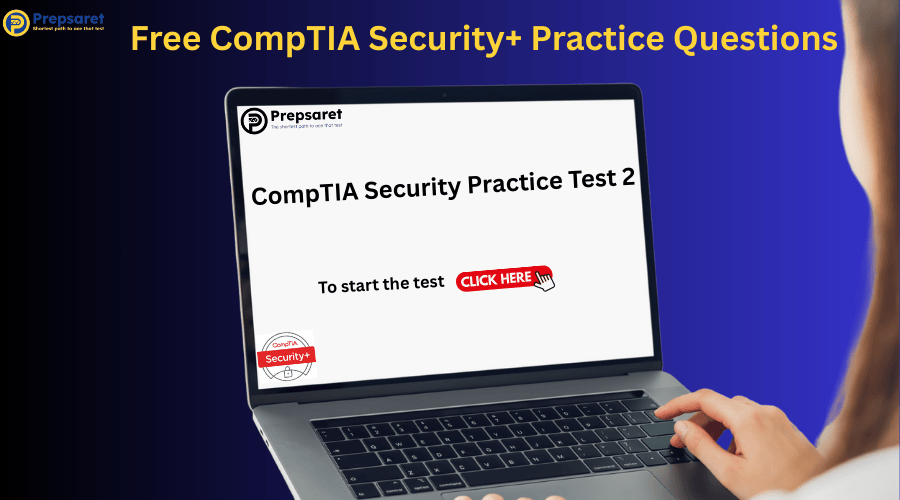Are you thinking about starting a career in cybersecurity? You’ve picked a great time! The demand for cybersecurity professionals is booming, and companies are desperately looking for qualified people to protect their digital assets.
Getting the right certifications is your ticket into this exciting field, even if you’re just starting out. Popular options like CompTIA Security+ give newcomers a solid foundation to build on.
Ready to take the first step? Prepsaret’s practice exams, and personalized study plans can help you prepare effectively and kickstart your cybersecurity journey today!
What Are Cybersecurity Certifications?
Cybersecurity certifications are credentials that prove you have specific skills and knowledge in protecting computer systems, networks, and data from digital attacks. Think of them as stamps of approval that tell employers you know your stuff!
These certifications do more than just look good on your resume. They can help you:
- Earn bigger paychecks (the highest-paying cyber security certifications can boost your salary by 15-30%)
- Stand out when applying for jobs
- Move up faster in your career
- Show employers you’re serious about keeping their data safe
These certifications do more than just look good on your resume. They can boost your earning potential in a big way! According to recent surveys, certified professionals often earn 15-20% more than their non-certified peers.
In the world of cybersecurity, where the average salary is already pretty sweet (often $80,000+ for entry-level positions), that extra percentage means a lot more money in your pocket. In today’s job market, where hundreds of people might apply for the same position, having relevant certifications helps you stand out from the crowd.
Employers often use certifications as a quick way to filter candidates, so having the right ones can mean the difference between getting an interview or having your resume tossed aside.
Top Cybersecurity Certifications for Beginners
If you’re new to cybersecurity, the number of available certifications might seem overwhelming. Let’s break down the best cybersecurity certifications for beginners and what makes each one special.
CompTIA Security+

The CompTIA Security+ certification is widely considered one of the best cybersecurity certification for beginners in the industry. It covers:
- network security
- risk management and assessment
- encryption
- Threat management
- Encryption methods
What makes Security+ great for newcomers is its broad coverage of security concepts without diving too deep into any one area. This gives you a solid foundation to build upon. Many government jobs and defense contractors actually require this certification, making it incredibly valuable for job seekers.
With this certification, you can pursue roles like cybersecurity analyst or security administrator, with starting salaries typically ranging from $60,000 to $85,000 depending on your location and experience.
CompTIA CySA+ (CompTIA Cybersecurity Analyst)
Once you’ve gotten comfortable with the basics, the CySA+ certification is a great next step. This certification focuses on threat detection and incident response – basically, finding bad stuff happening on your network and dealing with it.
The CySA+ validates your skills in vulnerability management, security operations, and detecting security incidents before they cause major damage. This certification is perfect for roles like:
- security analyst
- Security Operations Center (SOC) analyst
- vulnerability analyst
The salary for these job roles typically ranges from $75,000 to $95,000.
CompTIA CASP+ (CompTIA Advanced Security Practitioner)

The CASP+ certification is designed for professionals with some experience under their belt. It’s an advanced-level certification that dives deep into enterprise security, risk management, and security architecture.
This certification is perfect for those looking to move into roles like security architect, IT security consultant, or security manager. These positions often come with six-figure salaries, reflecting the advanced skills and knowledge required.
Certified Ethical Hacker (CEH)
The CEH certification is one of the most well-known in the industry. It focuses on ethical hacking and penetration testing – essentially, learning how to think like a hacker so you can better defend against them.
This certification validates your skills in ethical hacking techniques, vulnerability analysis, and exploitation. It prepares you for roles like ethical hacker, penetration tester, or security consultant, with salaries typically ranging from $80,000 to $130,000 depending on experience and location.
Certified Information Security Manager (CISM)
The CISM certification is geared toward those interested in management roles within cybersecurity. It focuses on:
- information security governance
- risk management
- incident response from a leadership perspective
This certification is ideal for roles like information security manager, security auditor, or risk manager. These positions often come with salaries ranging from $100,000 to $150,000, reflecting the leadership responsibilities involved.
Cybersecurity Certification: Why CompTIA Exams Are a Smart Choice for Beginners
CompTIA offers some of the most beginner-friendly certifications in the cybersecurity industry. Here’s why they’re often recommended as the first step for newcomers.
Overview of CompTIA Certifications
CompTIA certifications are vendor-neutral, meaning they’re not tied to specific products or technologies like Microsoft or Cisco certifications. This makes them broadly applicable across different industries and technology environments.
Another importance of CompTIA exams is the clear progression path CompTIA offers. You can start with basic certifications and work your way up as you gain experience and knowledge. This structured approach helps beginners build their skills logically without getting overwhelmed.
CompTIA Network+
Before diving into cybersecurity, having a solid understanding of networking is crucial. It covers network security basics certification and prepares you for cybersecurity roles.The Network+ certification validates your knowledge of:
- Network configurations
- Troubleshooting methods
- Infrastructure concepts
- Network operations
With this certification, you can pursue roles like network administrator, network technician, or IT support specialist. These positions provide valuable experience that will help you excel in cybersecurity roles later on.
CompTIA A+
The CompTIA A+ certification is one of the most foundational IT certifications available. It covers basic hardware, software troubleshooting, and IT support skills that serve as building blocks for more advanced certifications.
This certification prepares you for roles like IT support specialist or help desk technician. While not strictly cybersecurity positions, these roles often expose you to security concepts and provide a stepping stone into the field.
CompTIA IT Fundamentals (ITF+)
If you’re completely new to IT, the ITF+ certification is a perfect starting point. It covers basic IT concepts, terminology, and fundamental skills that provide context for more advanced topics.
This certification can help you land entry-level IT support or tech support assistant roles. These positions allow you to gain experience while preparing for more specialized cybersecurity certifications.
CompTIA Cloud+
As more organizations move their operations to the cloud, understanding cloud security becomes increasingly important. The Cloud+ certification validates your knowledge of:
- cloud computing
- cloud security
- cloud deployment models.
With this certification, you can pursue roles like cloud support specialist or cloud administrator, with starting salaries typically ranging from $65,000 to $85,000.
CompTIA Data+
Data security is a crucial aspect of cybersecurity, and the CompTIA Data+ certification focuses on data analytics and management skills that are increasingly valuable in security roles.
This certification validates your skills in data analysis, data mining, and visualization techniques. These skills are especially valuable in security monitoring and threat intelligence roles, where making sense of large amounts of data is essential.
CompTIA Pentest+
For those interested in the offensive side of security, the Pentest+ certification is an excellent option. It focuses on penetration testing methodologies, vulnerability scanning, and exploitation techniques.
This certification builds a strong foundation for specialized roles in offensive security and prepares you for positions like junior penetration tester or vulnerability assessor.
How to Prepare for Cybersecurity Certification Exam
Passing certification exams requires more than just memorizing facts. Here’s how to prepare effectively and increase your chances of success.
Practice Exams

Taking practice exams is one of the best ways to prepare for certification tests. Prepsaret offers: comprehensive practice exams for
These practice exams help you assess your readiness, improve your test-taking skills, and build confidence. Prepsaret’s practice exams also provide personalized feedback and progress tracking, allowing you to focus your studies on areas where you need the most improvement.
General Study Tips
Creating a study schedule is crucial for passing your exam. Most certifications recommend a preparation period of 60-90 days, studying 1-2 hours per day. Focus on your weak areas but don’t forget to review your strengths. A balanced approach will help you feel confident in every aspect of the exam.
Here are a few key tips to maximize your study time:
- Stay consistent: Stick to your schedule and study regularly to build momentum.
- Prioritize weak areas: Spend more time on topics you find challenging, but also revisit your strengths to reinforce them.
- Track progress: Regularly assess your improvement with practice tests and adjust your study plan based on what you need to focus on. Utilize online cybersecurity training for beginners
- Set small goals: Break down your study sessions into manageable chunks and reward yourself for completing them.
- Join online study groups: Join cybersecurity certification for beginners online forums.
To stay on track, use tools like Prepsaret’s study resources, which allow you to track your progress and adjust your study plan accordingly. Remember, success comes from steady progress.
If you’re looking for beginner cybersecurity training, there are plenty of online cybersecurity courses for beginners that cover the fundamentals of network security, ethical hacking, and risk management.!
Free and Affordable Cybersecurity Certifications for Beginners
Not every valuable certification requires a big investment. Let’s look at some free and affordable options for beginners.
Free Cybersecurity Certifications
The Google Cybersecurity Certification free option is a relatively new but increasingly respected credential. This program covers security fundamentals, network security, and basic threat detection.
For those on Reddit, the “cybersecurity certification for beginners Reddit” threads often recommend this as a starting point due to its accessibility and cost (free!).
- Google Cybersecurity Certification Free – Google offers beginner-friendly courses at no cost.
- Cybersecurity Fundamentals for Non-Tech Professionals – Cisco offers free introductory courses.
Other free options include Cybersecurity Fundamentals by Cisco, which provides a solid introduction to security concepts and best practices. These free cybersecurity certification for beginners options are perfect for testing the waters before investing in more advanced certifications.
Affordable Beginner Cybersecurity Certifications
Even paid certifications can be affordable with the right approach. The CompTIA Security+ exam costs around $370, but many employers offer reimbursement programs. There are also discounts available for students, military members, and those who bundle their exam with training materials.
- CompTIA Security+ – One of the best cybersecurity certifications for beginners with employer recognition.
- Cybersecurity certifications with no prerequisites – Many beginner-friendly options exist, like EC-Council Certified Cybersecurity Technician (C|CT).
When considering the return on investment, even paid certifications are typically worth the cost. A $370 investment in Security+ can lead to a $15,000-$20,000 salary increase, making it a smart financial decision in the long run.
Cybersecurity Certification Roadmap for Beginners

Creating a structured certification path can help you build your skills efficiently and avoid wasting time and money on certifications that don’t align with your career goals.
Step-by-Step Certification Path
A typical cybersecurity certification roadmap might look like this:
- Start with foundational IT certifications like CompTIA ITF+ or A+ to build basic knowledge.
- Move on to networking with CompTIA Network+ to understand how systems communicate.
- Begin your security journey with CompTIA Security+ or Certified in Cybersecurity (CC) to establish core security concepts.
- Specialize based on your interests:
- For defense-focused roles: CySA+ or GIAC Information Security Fundamentals (GISF)
- For offensive security: Pentest+ or EC-Council Certified Cybersecurity Technician (C|CT)
- For management: CISM or security-focused project management certifications
Following a structured path like this allows you to build on previous knowledge rather than trying to learn everything at once. This approach is widely recommended in cybersecurity certification roadmap discussions and can significantly reduce the learning curve.
Highest-Paying Cybersecurity Certifications for Beginners
Some certifications offer better financial returns than others, especially for beginners. Let’s explore some of the highest-paying cyber security certifications that newcomers can realistically obtain.
- CompTIA Security+ is often cited as having the best ROI for beginners. With an exam cost of around $370 and potential starting salaries of $60,000-$85,000, it’s easy to see why this certification is popular.
- For those willing to invest a bit more time, the CySA+ can lead to roles like security analyst or SOC analyst with salaries ranging from $75,000-$95,000. These positions are in high demand, with many companies struggling to fill these roles due to the cybersecurity skills gap.
- Other beginner-friendly certifications with strong earning potential include the EC-Council Certified Cybersecurity Technician (C|CT) and GIAC Information Security Fundamentals (GISF), both of which can open doors to entry-level cybersecurity roles with potential starting salaries of $70,000-$100,000.
- A Certified Ethical Hacker (CEH) can expect an average salary ranging from $90,000 to $105,000 annually. This certification equips professionals with the skills to identify vulnerabilities in systems, perform penetration testing, and secure networks from potential threats.
Security professionals with certifications typically earn 15-20% more than those without them!
As you gain experience and add more advanced certifications like CySA+ or CASP+, your earning potential continues to grow. Many cybersecurity professionals with 5+ years of experience and the right certifications earn well over $120,000 annually.
FAQs
What Is the First Certification I Need for Cybersecurity?
CompTIA Security+ certification is typically recommended as your first cybersecurity-specific certification. It provides fundamental knowledge across various security domains and is highly respected by employers in all industries.
How Can I Start a Career in Cybersecurity Without IT Experience?
Begin with entry-level certifications like Security+ or Google's program, build practical skills through home labs and online challenges, and network with professionals. Many successful security pros started without IT backgrounds!
Is CompTIA Security+ for Beginners?
Yes! CompTIA Security+ is specifically designed as an entry-level security certification. While challenging, it requires no prerequisites and serves as an excellent introduction to key cybersecurity concepts for newcomers.
Can I Get a Cybersecurity Job with a Google Certificate?
The Google Cybersecurity Certificate can help you land entry-level security roles, especially when combined with hands-on practice. Many employers now recognize this certification for positions like security analyst trainee.
Does Cybersecurity Require Coding?
Not all cybersecurity roles require coding skills. Cybersecurity certification like ethical hacking certification for beginners or digital forensics training courses, coding knowledge can be beneficial.
Start Your Cybersecurity Certification Journey Today!
Getting certified is your ticket to an exciting, well-paying career in cybersecurity. Whether you choose CompTIA Security+, the Google certification, or entry-level cybersecurity certifications, what matters most is taking that first step.
Ready to begin? Prepsaret’s comprehensive study resources, practice exams, and personalized study plans can help you prepare effectively and pass your certification exams with confidence. Your cybersecurity future starts now!

